Dear Reader, in this age of AI created content, please support with your goodwill someone who works harder to provide the human-made. Sign up at the top of the lefthand column or bottom of this page. You will receive my hand illustrated monthly newsletter RESTORE NATURE and access to the biodiversity garden design course as I write...and nothing else, I respect your time. I am also removing the advertizing as best I can as its become intrusive inappropriate and pays me nothing.
white flowers in late july in cape town
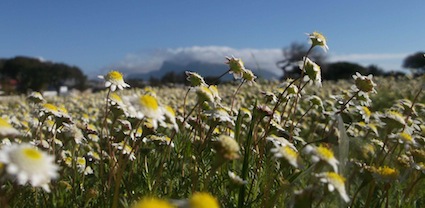
table mountain hidden in a cloud and a sea of honey perfumed cotula
White flowers come out in all their splendour in late July and early August in the Cape. It seems to be the commonest flower colour in terms of numbers, perhaps because it is an absence of colour, requiring less energy investment in the production of colouring molecules, which can be of many kinds. The flowers often seem to have reinvested that saved energy in perfumes. The most dramatic white flower is the large trumpet of the Arum lily (Zantedeschia aethiopica) which tends to grow on well watered slopes or wetlands in the wild. It used to grow in such numbers it was and still is harvested and sold by the armful in spring.
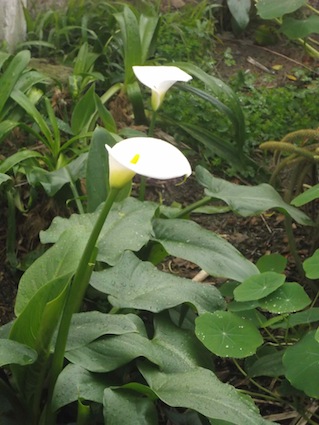
'tame' arums in a neighbourhood garden
I love Arums because they remind me of the farmlands covered with flowers near Darling, and I've spent years of my life going to the Darling flower show to sell my indigenous flower prints, and helped my mother collect plants in the area when we were both much much younger.
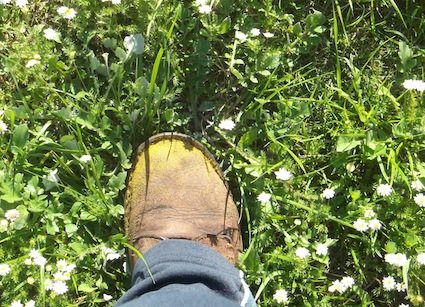
my camera's colour is bleaching out a lot, the coating on my shoes was a thick, rich yellow
Then there are the carpets of small white Cotula giving off a heady honeyed perfume, something like that of Camomile. They are buzzing with bees. I wondered why my shoes were going yellow, thought it was a new kind of leather mould, its been so damp. Then I realized it was pollen. I've never seen anything like it. If these tiny flowers produce so much pollen and have such a delicious smell they must surely be good for honey from a single source.

Cotula seem to flourish in the park. Such huge spreads of one species can be a sign of overuse of a piece of land, and this certainly applies in the case of the park which is probably species depleted. So the Cotula must be a pioneer of some kind and I think it would be an interesting addition in permaculture, to cover the ground, attract bees, perfume the garden. They can also be used as a lawn replacement while they are green. These are just the obvious uses. Ideally in permaculture (see my articles) every plant should have multiple uses. On top of the use for honey, perfume and ground cover, is the fact that it is indigenous. It can fill niches taken by exotics in the permaculture garden without any potential threat to the indigenous ecosystem. It could definitely be used to replace Camomile. I also found a yellow variant, only one little bush. It appears to have tinier ray florets, and a bigger disc, which allow it to appear bright yellow near the other Cotulas. It may be they are just more mature flowers though.
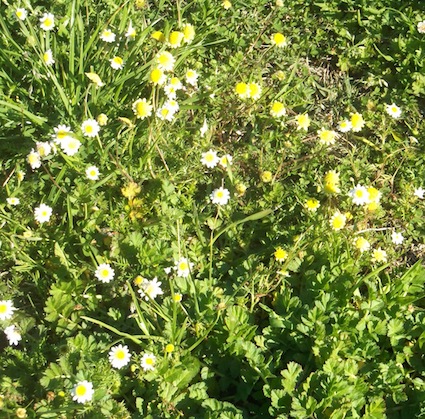
They are seen as weeds in this country and not cultivated. It is plants like this I want to raise in my nursery for the permaculture garden, as indigenous plants filling the right niches are often just not available on the market.
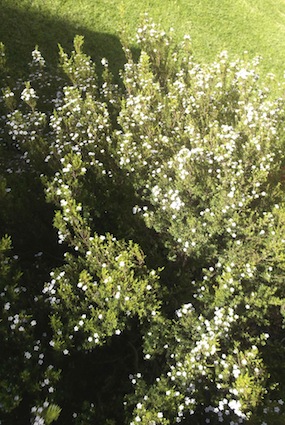
the delicate flowers of the confetti bush, perfect for prettier white flower arrangements
The Coleonema has started flowering. Its tiny white flowers giving it the common name ‘confetti bush’. The leaves are highly perfumed, its one of the Boechoe family with many medicinal uses, from human deodorants to teas.
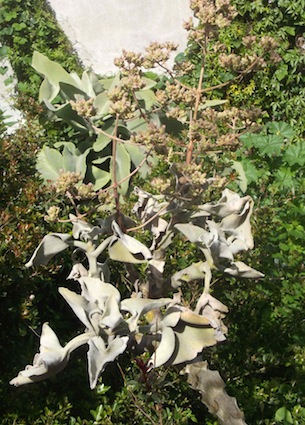
The odd little hairy bells of the giant kalanchoe
There are many shades of white all around now, too, which could be interesting. From the delicate light pinky white of Coleonema to the grey leaves and dirty pinkish white inflorescence of the giant Elephant Ear Kalanchoe.

narcissus can have the loveliest perfume
The perfumed Narcissus and the snow drops (Galanthus) are out, plants
which herald spring in Europe and in South Africa.
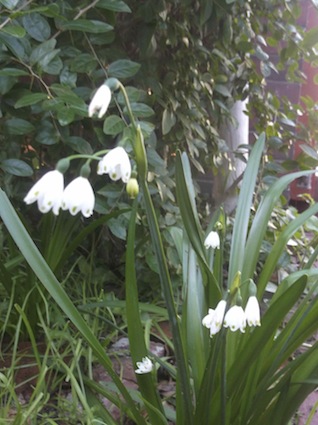
the fresh green spotted bells of the snow drops
All colours of Arctotis are starting to flower, and this includes the lovely white with the purple centre. We have an enormous wealth of the daisy form (Asteraceae) in South Africa.
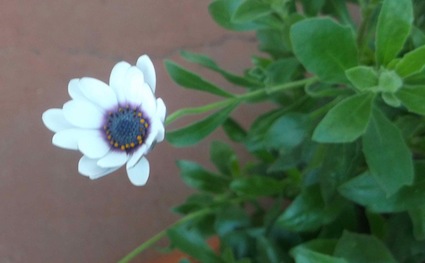
home page for more green inspirations
Restore Nature Newsletter
I've been writing for four years now and I would love to hear from you
Please let me know if you have any questions, comments or stories to share on gardening, permaculture, regenerative agriculture, food forests, natural gardening, do nothing gardening, observations about pests and diseases, foraging, dealing with and using weeds constructively, composting and going offgrid.
SEARCH
Order the Kindle E-book for the SPECIAL PRICE of only
Prices valid till 30.09.2023
Recent Articles
-
garden for life is a blog about saving the earth one garden at a time
Apr 18, 25 01:18 PM
The garden for life blog has short articles on gardening for biodiversity with native plants and regenerating soil for climate amelioration and nutritious food -
Cape Flats Sand Fynbos, Cape Town's most endangered native vegetation!
Apr 18, 25 10:36 AM
Cape Flats Sand Fynbos, a vegetation type found in the super diverse Cape Fynbos region is threatened by Cape Town's urban development and invasive alien plants -
Geography Research Task
Jan 31, 25 11:37 PM
To whom it may concern My name is Tanyaradzwa Madziwa and I am a matric student at Springfield Convent School. As part of our geography syllabus for this
"How to start a profitable worm business on a shoestring budget
Order a printed copy from "Amazon" at the SPECIAL PRICE of only
or a digital version from the "Kindle" store at the SPECIAL PRICE of only
Prices valid till 30.09.2023







